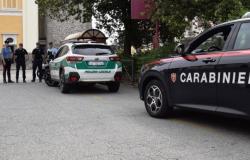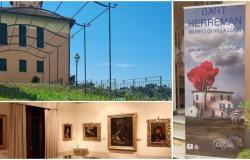The state road 16 from Bari to Brindisi it seems like a service road these days when Puglia is at the center of the world. A police car is stationed at every junction already at Polignano a Mare, when there are still about eighty kilometers to go to the Messapian capital. Only the exit for Savelletri is strangely not manned, but only because as soon as you exit the highway it starts therered zone around the Borgo Egnazia resort, a very strict safety belt to protect the seven leaders of the G7. Fewer cars than usual travel on this always crowded road, especially now that the summer season has begun.
Few heavy vehicles in circulation, only those authorized, this will be the case until Sunday. Many police vehicles, up and down between Bari and Brindisi, a frenetic succession of blue flashing lights.
A helicopter flies low over the road, it seems to want to land but it remains motionless in the air, it just wants to scrutinize the traffic up close.
You have the feeling of being on lanes reserved for the authorities, as if private cars on the highway were a kind of unwelcome guests to be tolerated. The arrival in the city is alienating. Brindisi, in the early afternoon, is ghostly. The sirocco is blowing, luckily the thermometer does not rise above thirty degrees.
The area close to the red zone is deserted, many shopkeepers decided not to even raise their shutters: partly because people are not free to move and business could go to hell, partly because those of the “No G7” are about to arrive in Piazza Vittoria and there are fears of riots. The owner of a tobacco shop that remained open complains to his colleagues: “This spreads insecurity and also creates a disservice for them.” These would be the military and law enforcement officers.
Present in thousands, of every specialty: even plainclothes police on motorcycles, even those with jet skis patrolling the port basin, even those in riot gear because you never know.
The traffic police are on duty from early in the morning (“without change”) and will be on duty until late at night when the gala dinner at the Swabian castle, hosted by President Mattarella, will be over.
A café near the train station, a stone’s throw from the last gate before the castle, is open. The owner is satisfied: «The regular customers didn’t show up, but we made up for it with lots of new faces». They are the agents and staff members who buzz around the few businesses that remain open. A few gaunt tourists are walking in the port area. The people of Brindisi, the few who are around, don’t complain, since the sacrifice won’t last long, only the inconvenience of leaving the cars far from the red zone. “If anything – says a disappointed 60-year-old – it’s surprising that the name of the city is never heard on the news: only Borgo Egnazia, which is a resort, but never Fasano and never Brindisi.” Certainly both cities are at the center of the initiatives of those who dissent from what they consider the perverse logic of the G7. In Piazza Vittoria, in Brindisi, when it is evening, the No G7 coordination table meets.
Representatives of the varied pacifist and anti-global world follow one another on stage. The first to speak is Bobo Aprile from Brindisi, former member of Cobas. «We have no reason – he shouts from the microphone – to be happy with this G7 which is leading us to the third world war. Today they decide to give 50 billion euros to Zelensky to continue a conflict that no longer has anything of the original motivations.
A war based on the need to expand the Western economy towards the East.” In other ways, we cannot even be calm about policies against climate change. «In the G7 countries – underlines Aprile – there is not even a moderate decline in the use of fossil fuels. An attitude which is accompanied, in recent news, by the decision to impose duties of up to 38% on the importation of Chinese electric cars into Europe: they rinse their mouths with economic freedom and then impose the duties. The only thing that heartens us about this G7 is the presence of the Pope.” In the square, a few hundred people and a swarm of journalists from all over the world, attracted, it must be said, by the dishes placed on the table of a “public dinner”: a contrast to the large banquet taking place a few hundred meters away, in the castle Swabian. The No G7 table offers frize with fiaschetto tomato and oil, homemade bread, then also meat and couscous prepared by the African community of Brindisi. One of them, Drissa, denounces the racist attacks that African laborers have been suffering for days in the countryside between Carovigno and San Vito dei Normanni, “without anyone saying anything, because here everyone is busy talking only about the big seven”.
The news of the day is that the No G7 table has split. A press conference by CGIL, Arci, Anpi, Pax Christi, Third Sector Forum and various other acronyms is scheduled for this afternoon in Fasano. Let’s put it this way: the most moderate part of the movement. A procession will follow through the streets of the city. Aprile and his men will parade on Saturday. «And yet – says the former trade unionist – we had agreed in a meeting in Bari to do everything together. The CGIL wanted otherwise and we don’t know why.”






